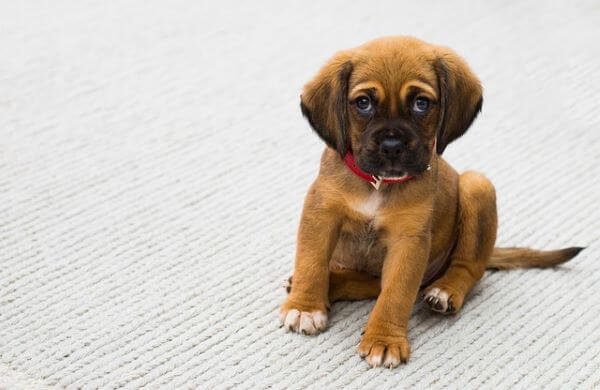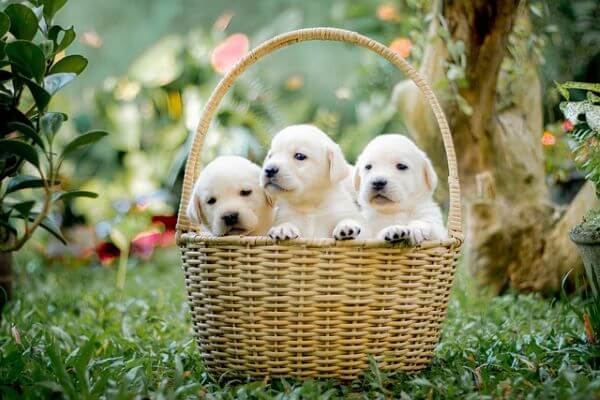Explore, does birth order matter in puppies, regards personality, temperament and dominance. See my research, and opinion so you can love 'em, quirks and all!
To understand the importance of birth order in puppies, delve into the impact on socialization, the effects on temperament, and the influences on dominance.
By examining these sub-sections, you start to evaluate the puppy development and gain a deeper appreciation for the ways in which birth order can shape a pup's personality and behaviour.
The Impact of Birth Order on Socialization
Puppy socialization is key. Birth order has a big effect on their development. Firstborns usually get more positive interactions, making them more confident and friendly compared to their siblings. Later-born puppies, however, are often more submissive and timid.
As the litter size grows, social dynamics get complicated. Second-born puppies often end up leading their siblings and become responsible and assertive. Later puppies usually take longer to start interactions with others and are less demanding.
One very important issue you should assess for newborn puppies is are they gaining or losing weight, read my post here called "Do puppies lose weight after birth?"
It's important to give individual attention when socializing puppies. Interacting one-on-one helps build strong bonds between owners and each puppy. Plus, giving equal amounts of playtime, food, water, toys, and love can reduce sibling rivalry.
By understanding the importance of birth order, owners can adjust their care. Offer individual attention and equal chances among littermates and you'll end up with well-balanced, adult dogs. So why be the middle child when you can be the alpha pup?
If you want to know more about the general health of your pup, read our article about "Do puppies joints click?"
The Effects of Birth Order on Temperament
Birth order matters for puppies' temperaments. First-borns are dominant and assertive, while the youngest are submissive and adaptable. This early positioning sets their personality for life.
Birth order affects behaviour too. First-borns usually follow rules and accept authority. Middle children often act rebellious and seek attention. Youngest ones are free and love affection.
The number of puppies in a litter matters. With two, they tend to be closer. When there are more, they compete for resources.
To shape a puppy, spend time with them and give them socialization and training. Consistency helps them form positive behaviours and habits that will influence their adult self.
First-born or last-born, every puppy can be a leader - just ask my chewed up shoes! They will also quickly become a much loved member of the family.

Does birth order matter in puppies for Dominance?
Puppies' birth order can affect their dominance behaviour. As each pup is born, they start to interact with their littermates and set up a power hierarchy. This hierarchy can stay the same their entire life, impacting how they relate to other dogs and people.
Let's look at the data:
| Birth Order | Dominant Behaviours Exhibited |
| First | More likely to be dominant |
| Middle | Can go either way |
| Last | Less likely to be dominant |
The table shows that first-born pups are more likely to be dominant compared to their younger siblings. Though, dominance isn't only based on birth order. Things like size or temperament can also play a role. Knowing the potential impact of birth order on dominance can help you make the right decisions when getting a puppy or managing existing dog relationships.
Research has shown that birth order affects human behaviour and personality traits too. A Norwegian study found that first-borns are usually more conscientious. While a British study showed that last-borns are more likely to be rebellious.
Therefore, birth order can have a large influence on dominance and other behavioural traits, in both puppies and people. The runt of the litter will always be last in line for treats and belly rubs.
Birth Order and Litter Dynamics
To understand the intricacy of birth order in puppies, it is essential to comprehend birth order and litter dynamics, understanding litter dynamics, birth order and sibling interactions, and the significance of early developmental stages. These sub-sections can offer a deeper insight into the complex dynamics that determine individual personalities, behaviour patterns, and overall health that help in comprehending how birth order matters in puppies.
Understanding Litter Dynamics
'Litter dynamics' is the name given to the complex behaviours and relationships among siblings in a litter. Birth order can be a key element in the creation of these dynamics. The first-borns often have more control over resources, whilst the younger ones learn to adjust and negotiate. As they get older, the interactions between them shape their personalities and social skills.
Birth order isn't the only factor influencing litter dynamics. The size of the litter, the sex ratios, maternal behaviour and competition for resources can all have an effect on sibling relationships. Comprehending these factors can aid in predicting how siblings will interact and develop.
To make sure a steady litter dynamic and reduce conflict, furnishing enough resources such as food, shelter and toys is essential.
Additionally, separating aggressive individuals or providing private space could also help keep harmony within a litter. Proper management of litters can result in positive behaviours that continue into adulthood for all members.
Birth Order and Sibling Interactions
The order of siblings' births can shape their interactions. Research suggests birth order is important for their relationships and behaviours. The eldest may be responsible, while the youngest may seek attention. Birth order can even affect personalities and cognitive abilities.
As siblings grow, age gaps, gender, and other factors can impact their relationship. Older ones often get more privileges and responsibilities, which can lead to resentment. Parents may unintentionally contribute to rivalry by favouring one child, which can damage mental health later in life.
Parents should treat all children equally and recognize their personalities. They should also create opportunities for positive interaction. Participating in activities together helps siblings build strong bonds. Communicating, showing affection, and resolving conflicts can prevent resentments from forming.
In conclusion, birth order has a major influence on sibling relationships, affecting personalities, behaviours, and hierarchies. Parents should foster strong ties through equal treatment, communication, and shared activities. This will ensure healthier relationships and stronger family ties.
The Significance of Early Developmental Stages
New-borns’ early stages are critical for their future. Experiences form their personality, intelligence, and social skills. Birth order and litter size impact growth and development too. As litter size increases, offspring get less attention and grow smaller. Firstborns usually get more resources and survive better.
Environment matters too. Temperature, humidity, and nutrition shape genetic expression, changing birth order effects on growth.
Breeding tips:
- Give optimal conditions for all new-borns.
- Equal access to resources helps avoid stunted growth or development differences.
So, watch out for who's fastest at swimming to the egg!
Factors That Affect Birth Order
To understand the factors that affect birth order, namely litter size and its impact on birth order, mother’s age and health, and genetics and its relationship to birth order, you need to explore the science behind the birth order of puppies. Each of these sub-sections plays a significant role in determining the hierarchy within a litter, and, the long-term development of each individual puppy.
Litter Size and Its Impact on Birth Order
Litter size has a big influence on the birth order of animals. With bigger litters, there's more variation between the littermates, leading to different personalities and characteristics.
We made a table to show how litter size affects animal birth order. For cats, small litters produce firstborns more often than larger litters. But, for dogs, smaller litters tend to produce more last-borns.
Litter size affects animals during and after their gestation period. It can also be impacted by seasonal variation and competition over resources like nutrition.
Plus, some species use postnatal communication, like vocalizations or scent-markings, which make understanding birth order more difficult.
One dog owner reported observing differences between her firstborn and last-born. The eldest was a protector, while the youngest was playful and clingy. This shows how animal personalities can vary due to changes in litter sizes, and birth order.
Mother's Age and Health
Maternal age and health are essential to the birth order of babies. Older mothers have an increased risk of pregnancy complications, while younger ones face a higher chance of premature birth and low birth weight infants. Studies reveal that older mums are more likely to have firstborns or only children, which can be due to infertility struggles or smaller families. Conversely, younger mums are more likely to have more children.
It's vital for mums-to-be to look after their health and get proper prenatal care, no matter their age. For example, a friend of mine in her 40s had fertility issues, eventually giving birth to her first child via IVF.
Maternal age and health significantly affect the birth order, and both parents and healthcare providers must take this into account. By prioritizing maternal health, families can increase their chances of having a healthy birth, regardless of their desired family size.
Genetics and Its Relationship to Birth Order
Genetics have a big role in birth order. Studies show that genes may affect a child's character, behaviour and school results. This can change how parents handle each of their kids, depending on their birth order. Birth order is also associated with inherited traits, with certain qualities occurring frequently in firstborns or middle children. So, genetics are key in forming the bond between birth order and personality.
Research further suggests that genes might influence how siblings relate to each other. For example, shared genes mean first-borns are often more responsible and caring, while younger siblings are more introverted and lively. These differences come from bodily disparities in neurological development, caused by age gaps between siblings.
Overall, genetics are a major contributor to birth order relationships and personalities between siblings. To make sure family unity is maintained despite natural variations, parents should motivate communication between siblings, be fair to all kids and focus on their strengths instead of comparing them to others. These tactics help each child reach their potential and build strong family ties. So why be the alpha dog when you could be the first-born human?
Implications of Birth Order for Puppy Selection
To select the right puppy based on birth order with the relevant factors, understanding the needs and characteristics of each birth order position is crucial. This section, 'Implications of Birth Order for Puppy Selection' in 'Does birth order matter in puppies,' will provide you with insights into the sub-sections: 'Choosing the Right Puppy Based on Birth Order,' 'Factors to Consider When Selecting a Puppy,' and 'Understanding the Needs and Characteristics of Each Birth Order Position.'
Choosing the Right Puppy Based on Birth Order
When selecting a pup, birth order matters. Here's what to remember:
- First-borns may be independent and dominant, yet careful.
- Later-borns may be social and loving, but harder to train.
- Middle-borns can have traits of both first and last-borns, making them an ideal compromise.
- To balance out personalities, many suggest taking two from different birth positions.
It's important to note that these rules don't always apply to every pup. Observe the litter before deciding.
Also, breed and environment can shape a pup's personality. A reputable breeder or adoption agency can provide more info on the needs and temperaments of different pups.
I once knew someone who got two later-born pups from the same litter. They were so attached, but could not cope when apart. It shows the importance of considering each pup's individual character and birth order dynamics when selecting.
Finding the right pup is like playing Tetris - fitting love and responsibility into your life.
Factors to Consider When Selecting a Puppy
Choosing the Perfect Furry Companion: Considerations When Picking a Puppy
When looking for a pup to join your family, five key elements must be considered. These are:
- Size & space needed
- Exercise & activity levels
- Socialization & training needs
- Grooming needs - coat type & shedding
- Health risks associated with breed
It's important to find a balance between these factors when selecting a puppy. That way, both you and your pet can have a long-lasting relationship.
Also, consider the pup's birth order when picking one. This can affect how they interact with humans and other dogs.
Visit reputable breeders or rescue centres for help in finding the right pup. Also, know about temperament testing methods, as they can affect how well a pup adjusts to its new environment.
Following these tips will give you peace of mind by ensuring the pup's health, happiness, and wellbeing. So, find the companion who understands your struggles - whether you're a first-born, middle child, or baby!

Understanding the Needs and Characteristic of Each Birth Order Position
Birth order is key when choosing a puppy. Each position has unique needs and characteristics to consider. Knowing first-borns are reliable, obedient, and loyal; middles are adaptable, social, and well-rounded; last borns are often playful, energetic, and attention-seeking helps make an informed decision.
Relating these traits to dog breeds matters too. A Labrador Retriever is a good fit as a first-born due to their attentive nature. Golden Retrievers can handle being a middle-born, since they enjoy pleasing and playing. Poodles can work for first or last-borns, due to their smarts and quick adaptation.
A pup's birth order shapes its personality and behaviour. Being the smallest might make them bossy or over-dependent. Being the only female could make them protective of their area.
For example, Conan the Belgian Malinois. He served in the U.S Special Operations K9 Patrol, chasing down Baghdadi in 2019. He was disciplined and loyal - typical first-born traits.
Birth order affects us all, from sports types chosen by kids to work partners chosen later in life. Understanding this principle makes it easier to select puppies that fit your home. So take care when deciding, as birth order will determine your pet's behaviour.
The quiet puppy in the litter
A lot of people actually prefer the quietest puppy in the litter. They can become very social, though a little nervous with new sights and sounds at first. Once you build up that trust with them they will really love and trust you. They will appear to appreciate you more as they come to rely on you as a mother figure.
Sometimes it's nice to have a dog that isn't up in our face the whole time, and can just sit and people watch.
Conclusion: Birth Order is an Important Factor to Consider in Puppy Selection.
Puppies' birth position matters. It affects their growth, energy, personality and response to training. Those born first often lead, while those born last may need extra love. When selecting a pup, consider birth order.
But remember, the pup's individual personality is also important. It develops from its experiences with mom and siblings. Breeders usually watch the litter for some weeks so should be able to guide you. It is worth spending some time quietly observing the litter before you make your choice.
